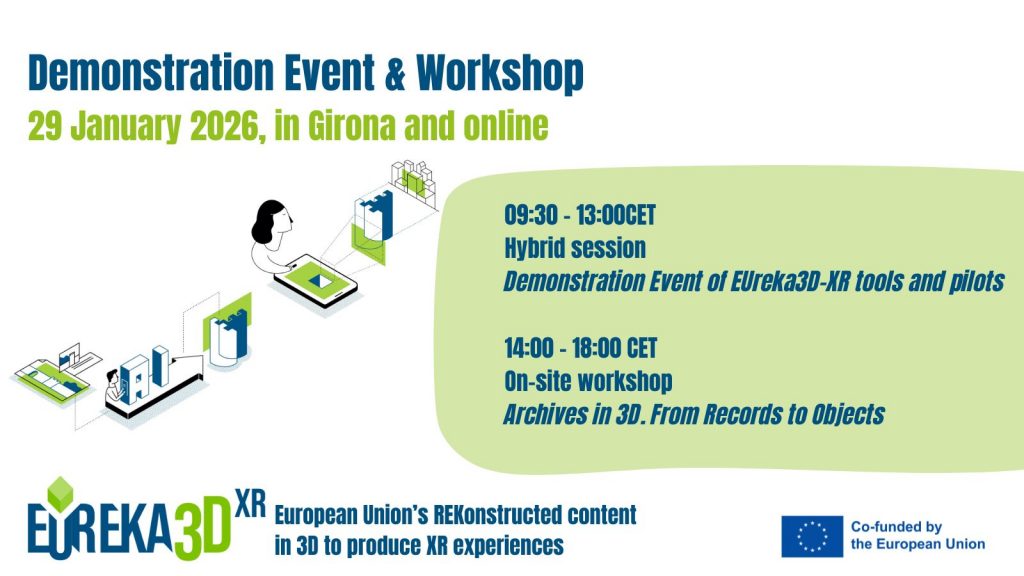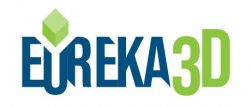A morning hybrid session and an afternoon on-site workshop
29 January 2026, 9.30 – 18.00h (CET), in Girona and online

The EUreka3D-XR organizes a Capacity Building and demonstration event at a moment when the project’s progress in the development of tools and pilot scenarios has become both visible and significant, offering tangible insights into how 3D and XR technologies can serve the cultural heritage sector.
Cultural Heritage professionals, archivists, researchers, and students of these fields are invited to an open event showcasing the outcomes of the project and mainly focusing on the innovative tools developed to enhance access and engagement with digital cultural heritage through 3D and Extended Reality (XR) technologies.
The day will be divided into two parts: a morning hybrid session, focused on demonstrations of the EUreka3D-XR tools and discussion on pilot scenarios; and an afternoon on-site workshop, dedicated to archivists and focused on hands-on experimentation with one of the project’s tools.
Morning hybrid session: Demonstration event of EUreka3D-XR tools and pilots
(in English)
The morning session will introduce the main results of the EUreka3D-XR project, which explores how 3D and XR technologies can be integrated into the workflows of cultural heritage institutions. Through a series of live demonstrations by the project’s technical partners (Swing:It, NTUA, and MiraLab), participants will discover the EUreka3D-XR Toolbox —a collection of open, interoperable tools designed to support the creation, processing, and dissemination of 3D and XR heritage content—.
The round table The potential of 3D for Cultural Heritage will follow, focused on the pilot scenarios, with the participation of the three scenario leaders (CRDI, Bibracte, and CUT), together with an invited institution that has collaborated with the project: Giravolt, the Catalan Cultural heritage’s new 3D digitisation project (part of the Catalan Agency for Cultural Heritage).
These scenarios demonstrate practical applications of the tools in real cultural heritage contexts, from archaeology and museums to archives and heritage sites. The presentations will highlight how digital innovation can make heritage more accessible and interactive, and how these tools can support professionals in managing and sharing their 3D assets.
Programme:
- 9.00h – Welcome coffee
- 9.30h – Welcome message by Lluís-Esteve Casellas (Head of Department of Records Management, Archives and Publications at Girona City Council) and David Iglésias (Head of Department of Photography and Audiovisual Records at Girona City Council)
- 9.35h – Introduction by Antonella Fresa, EUreka3D-XR Project Coordinator
- 9.45h – EUreka3D-XR toolbox demonstration, by Frederik Temmermans (imec), Angelo Belfiore (Swing:It), Leonidas Mavrotas (NTUA), Nedjma Cadmi (MIRALab)
- 10.45h – Q&A
- 11.00h – Round table The potential of 3D for Cultural Heritage, by David Iglésias (CRDI – Ajuntament de Girona), Vincent Guichard (Bibracte), Marinos Ioannides (CUT), Albert Sierra (Agència Catalana del Patrimoni Cultural)
- 12.10h – The Augmented Reality experience in the Iberian City of Ullastret, by Laura Romero (Museum of Archaeology of Catalonia), Miquel Lleixà (Digital Policies Department – Generalitat de Catalunya), Òscar Gómez (Tururut, AR developer company)
- 12.30h – Q&A and end of morning session
- 12.45–14.00h – Lunch break
The morning session will be held in hybrid format (in-person at El Modern – Centre Audiovisual i Digital, Girona and online).
Afternoon on-site workshop: Archives in 3D. From Records to Objects
(in English and Catalan)
The afternoon session offers a practical and collaborative workshop aimed at archivists, records managers, and IT professionals working in archives. It will build on the progress made by CRDI and Swing:It during the project, exploring how archival documents—such as photographs, maps, drawings, engravings, or videos—can serve as the basis for creating 3D and XR experiences.
Participants will be invited before the workshop to propose new use cases from their own collections, with the goal of generating a new 3D model from archival documentation. Three of these use cases will be selected by CRDI and Swing:It, and the workshop will focus on developing them in depth.
During the session, attendees will be organised into small working groups to collaborate on the selected cases, with direct support from the Swing:It team. The archivists responsible for the chosen cases will provide relevant materials in advance, ensuring that each group can actively test and apply the tool in a realistic archival context.
By: Swing:It and CRDI
Time: 14.00 – 18.00h
Venue: El Modern – Centre Audiovisual i Digital, Girona

